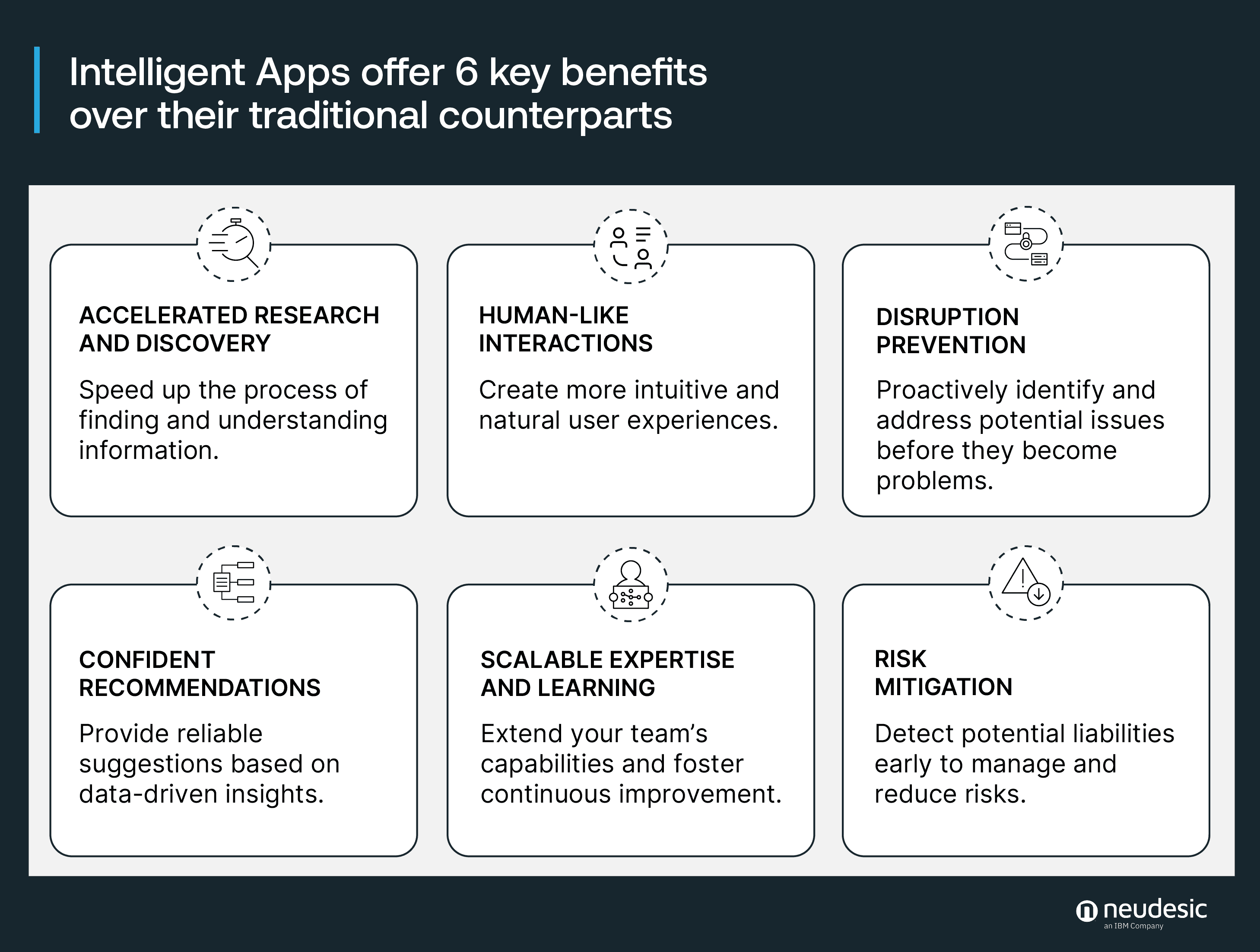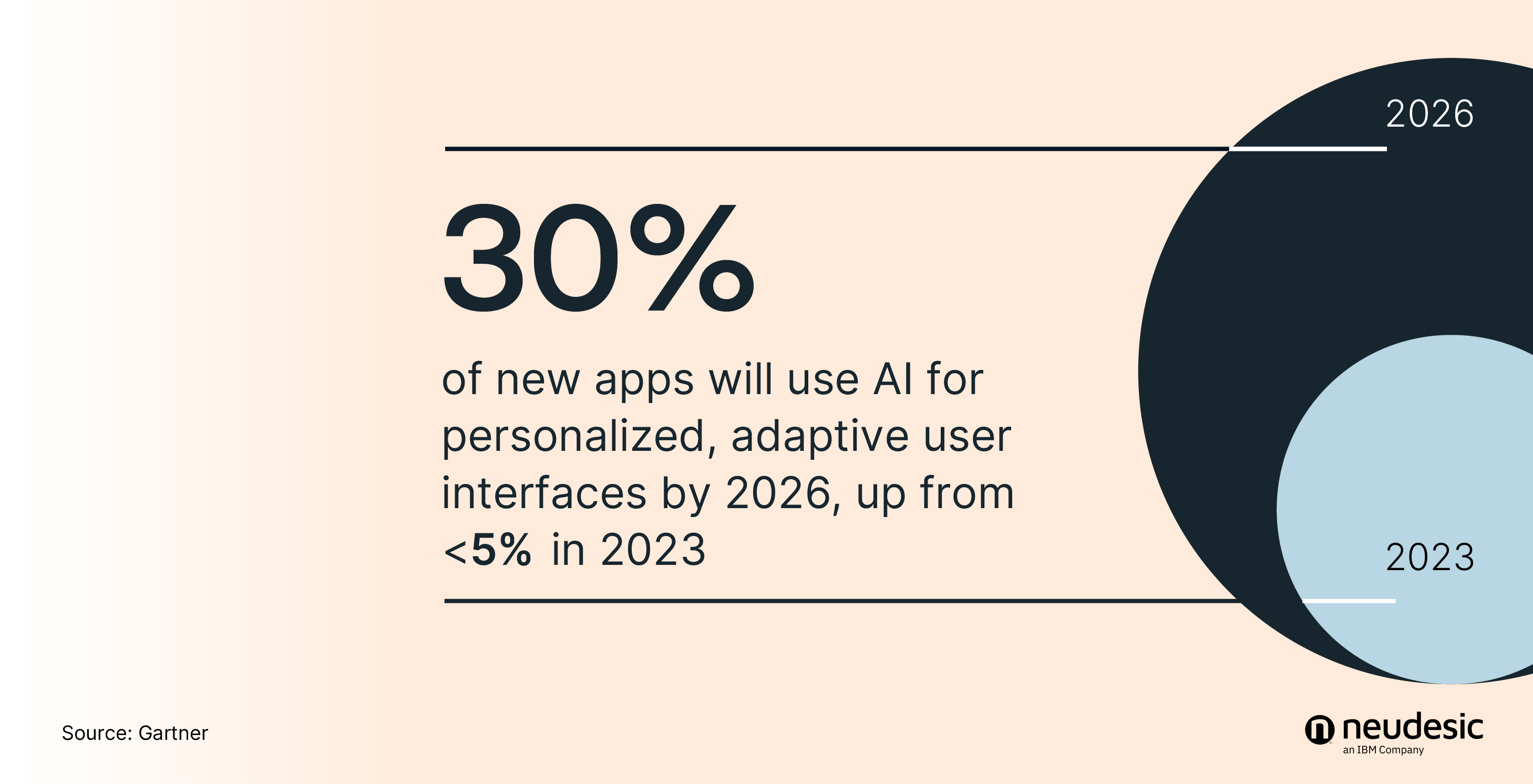
Today’s users and systems have placed unprecedented demands on the applications they use. For product development teams, meeting these needs-and staying ahead-is a constant challenge that requires careful resourcing, prioritization, and specialized skills. Enter Intelligent Applications.
This new generation of AI-driven software offers capabilities and experiences that far surpass their predecessors. Intelligent Applications can adapt to the needs of users, both systems and people, based on past interactions and desired outcomes. Examples include obvious ones like copilots, AI agents, and chatbots, as well as subtler ones like Netflix movies and Amazon product recommendations.
However, we are just beginning to explore the potential of these next-generation applications. At Neudesic, we’ve identified six key areas where Intelligent Applications can significantly impact your product development efforts:

The power of Intelligent Applications lies in their ability to enable teams, even those with limited resources, to achieve extraordinary outcomes. By leveraging these AI-driven features, you can not only meet but exceed user expectations and drive your product forward in innovative ways.
According to Gartner, it’s predicted that 30% of new apps will use AI for personalized, adaptive user interfaces by 2026, up from less than 5% in 2023. Embracing Intelligent Applications today positions your team to be at the forefront of this transformation.
Intelligent applications accelerate research and discovery
Intelligent applications allow you to spend less time looking for the information you need so that you can spend more time acting on it. These apps automate the processing of millions of data points and then provide suggestions about where the human workforce should be allocating their efforts.
A shining example is IBM’s RXN for Chemistry. This platform uses AI to generate hypotheses for chemical synthesis and then devises step-by-step recipes for creating molecules in an automated lab. The application leverages language models trained on millions of chemical reactions to predict how organic molecules will react and suggests methods for synthesizing new molecules. This approach significantly speeds up the drug discovery process by automating and optimizing the synthesis of new compounds, allowing researchers to quickly test and validate new drug candidates.
In another example, Hanover Research, a market research consulting firm, supercharged its 20 years of research with an interactive chatbot, accelerating time-to-insight by a factor of 10.
Regardless of your industry, intelligent apps are supercharging the research and discovery process, cutting costs and generating revenue along the way.
Intelligent applications enrich human-computer interactions
Intelligent applications are revolutionizing our interactions with machines, making them smarter, faster, and more human-like. For non-technical users, interacting with machines can often feel alienating. However, intelligent apps are easing this transition by introducing advanced reasoning and new interaction modalities, such as voice, vision, and gestures.
A compelling hypothetical example is the enhanced ChatGPT-4o model, which can infer human emotions by analyzing vocal intonations and facial expressions. Combined with its natural language processing (NLP) capabilities, these inputs unlock new human-AI interactions. Imagine a customer support scenario where a customer calls for help with a malfunctioning product. ChatGPT-4o’s virtual assistant could detect emotions like frustration and adapt its responses accordingly. For instance, if the customer sounds frustrated, the assistant might respond empathetically, offering step-by-step solutions in a supportive tone and adjusting its speech patterns to match the customer’s emotional state. This could significantly improve issue resolution and user experience.
Additionally, democratizing access to data is another area where NLP excels. Microsoft Fabric and its copilot capabilities enable non-data scientists to ask questions of their data naturally and receive reports in seconds. By recognizing and adapting to emotional states, AI-driven virtual assistants can effectively resolve issues and build customer trust and loyalty, showcasing AI’s potential for pioneering more human-like interactions.
Anticipate and Preempt Disruptions
Regardless of which systems your organization depends on, intelligent applications can use AI to continuously monitor the health of your critical business systems and then detect and even correct potential problems independent of human intervention. At Neudesic, we are well-versed in Intelligent Operations, which employs automated management to modernize operations and promote efficiency and resiliency.
At a utility company, for example, an intelligent app can use AI algorithms to analyze data from sensors and historical maintenance records to detect patterns indicative of potential failures. The app can identify temperature fluctuations, abnormal voltage readings, or unusual load patterns that may precede equipment breakdowns. When these patterns are detected, the app can alert maintenance teams to investigate further and take preventive action, such as repairing or replacing the equipment before it fails. By preemptively addressing potential issues, companies can reduce the risk of outages, minimize downtime, and optimize maintenance schedules, ultimately improving service reliability and customer satisfaction.
Many organizations have become accustomed to disruptions in their mission critical systems. But intelligent applications can monitor systems as a whole to bring forth a higher standard in system reliability.
Recommend with Confidence
Applications have been making recommendations for years, but intelligent apps can now recommend with a different level of confidence. Powered by new-age AI models, intelligent apps are now capable of ingesting more nuance and considerations of your business than legacy applications. And as apps better understand your business, they can better inform decision-making, offer more personalized advice and even foster stronger customer relationships.
Let’s take media companies’ content recommendation platforms as an example. Intelligent apps can use AI algorithms to continuously analyze data from user interactions with the company’s website, app, and content library. By learning the nuances of each user’s content preferences and consumption habits, the app can generate personalized content recommendations with a high degree of confidence. These apps suggest sports-related articles, videos, and live streams based on the user’s favorite teams or athletes, even taking into account factors like a user’s current location and the time of day. The result is increased user engagement: longer session durations; higher click-through rates; more frequent interactions with the platform. This is the currency that helps media companies grow.
Scale Expertise and Learning
Though the automation of insight and action offers obvious benefits, intelligent apps can also scale the augmentation of our day-to-day obligations-whether that be at work or at home.. More specifically, these apps can seamlessly combine employee expertise with the most current industry insights to ensure collective knowledge is available to everyone in your organization.
Morgan Stanley offers a powerful use case: they fine-tuned a large language model on their proprietary data so that every employee has access to well-curated enterprise knowledge, regardless of their domain expertise. Morgan Stanley fed 100,000 of its own documents into an intelligent application that now makes that information readily accessible for 16,000 financial advisors. If financial advisors have questions about what Morgan Stanley’s data says about the future of a stock, or how to include an IRA into a trust, or who the main competitors are in a specific market, their app gives them answers.
Critical to Morgan Stanley’s app is their rigorous data governance over the years. Their financial advisors could ask GPT-4 for answers to the questions above, but an LLM trained on such a broad data corpus is unlikely to spit out answers that align perfectly with Morgan Stanley’s processes or expertise.
But not every company has 100,000 well-structured documents ready to be plugged into an intelligent system. The sooner you prepare your proprietary data for input into intelligent applications, the sooner you can start scaling enterprise knowledge with confidence.
Detect Liabilities and Mitigates Risk
New threats, compliance requirements, and operational needs seem to emerge daily, creating new challenges for IT leaders. Intelligent Apps can help organizations train, monitor, and manage systems to understand and adapt to these changes faster than ever before.
JPMorgan Chase has developed a program called COiN (Contract Intelligence), that uses machine learning to review and analyze legal documents. COiN can interpret complex legal documents to extract critical data points and clauses, significantly reducing both the time and labor needed in legal reviews and the compliance issues that stem from oversight. JPMorgan’s application has made the company more confident in their ability to detect potential legal and compliance risks, and to do so quickly.
Given the advantages that AI-driven apps like COiN have given JPMorgan, their $12 billion/year investment in AI starts to make a lot more sense. You may not have $12 billion to spare on intelligent applications, but given the average 8x ROI for artificial intelligence projects, a penny spent on AI will likely yield far more than a penny earned.
Conclusion
Intelligent applications will soon be a competitive requirement, but understanding their benefits is simply the first step. Understanding the viability, desirability, and feasibility of an intelligent app requires a healthy foundation of data governance, expertise with AI, and strong grasp of user challenges. If you want your company to learn and act faster than your competitors, we’d love to hear from you and see how we might be able to help. Contact us to get started!
Related Posts
